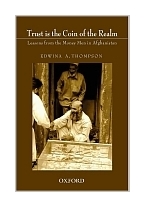Trust is the Coin of the Realm
Lessons from the Money Men in Afghanistan
- Easy, accessible style despite technical content Combined theoretical quality
and empirical scope Policy relevance - after 8 years of conflict and development
assistance, a solution to Afghanistan's problems still eludes policymakers in the world's
capitals. This book presents a fresh look at why state-building efforts have failed, and
encourages more open dialogue between external reformers and the local institutions they
seek to engage, and often disrupt
- Author is a white, Western woman who conducted interviews at the height of the
war on terror on Afghanistan within Afghanistan
- Book on trust, based on interviews that also required a high degree of trust
between author and subjects in the 'underworld' (mainly 'money-men' whose activities
blended with the illegal trade in opium)
Trust is the Coin of the Realm shines a rare light into the labyrinth of Afghanistan's
'money men' and their influential informal economy that links the Islamic world. Hawala is
the ancient financial system that predates Muhammad, and provides a vital key to engaging
with many of the world's traditional cultures. Stereotyped as 'built for terrorism' and a
dangerous pipeline for dirty money in the wake of 9/11, Thompson reveals it to be
indispensable to the work and reach of humanitarians, donors, family members, and the
business community. Outsiders striving to build states and peace in crisis countries will
find this book invaluable for earning the trust that is essential if their efforts are to
make a lasting difference.
Readership: Scholars, policymakers and individuals interested in the interplay of state
failure, development and security.
Table of Contents
PART ONE: METHOD AND THEORY
1. Introduction
1.1 Importance of the Study
1.2 Definition of Key Terms
1.3 Scope and Method
1.4 Challenges and Limitations
2. Legitimacy and the State-building Project
2.1 The Problem
2.2 The Popular Response
2.3 The Way Forward
2.4 Implications
PART TWO: LEGACIES
3. Islam, Terrorism, and the Origins of Hawala
3.1 Conventional Wisdom
3.2 Etymology of Hawala
3.3 World Commerce
3.4 Role of Islam
4. Hawala and the Politics of Survival
4.1 Empire and State Regulation
4.2 The Bazaar
4.3 The Indian Trade Diaspora and 'Family Firm'
4.4 Conventional Wisdom Unravelled
PART THREE: LINKAGES
5. Ritual and Rationality
5.1 War and Migration
5.2 Ethnicity
5.3 Stereotypes and Social Organisation
5.4 Rationality
5.5 Conclusion
6. Globalisation and the Money Dealer
6.1 Global Connections
6.2 Global Financial Systems
6.3 Black Holes and the Borderless World
PART FOUR: LEGITIMACY
7. Informal Economy Revisited
7.1 Opium Harvests: Linkages with the Trade
7.2 Black Money: The Money Dealer's Perspective
7.3 Effects of War
7.4 Conclusion
8. Symbols and Substance of Liberal Reform
8.1 What They Want: Transformation
8.2 How They Engage: The Bargain
8.3 Principles and Pragmatism
8.4 Conclusion
9. Concluding Remarks
350 pages, Hardcover
Księgarnia nie działa. Nie odpowiadamy na pytania i nie realizujemy zamówien. Do odwolania !.


